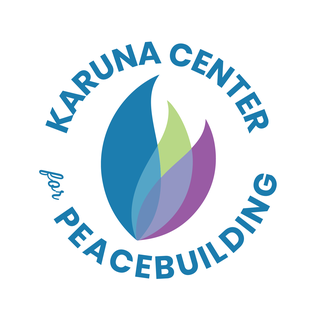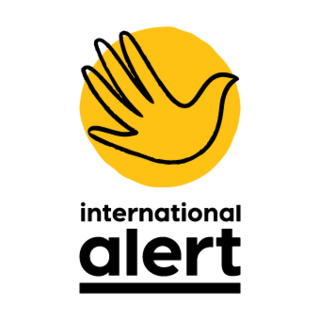Related Research Articles

Nonviolent Peaceforce (NP) is an international nongovernmental organization that employs Unarmed Civilian Protection. Their mission is to protect civilians in violent conflicts through unarmed strategies, build peace side-by-side with local communities, and advocate for the wider adoption of these approaches to safeguard human lives and dignity. NP holds Special Consultative Status with the Economic and Social Council of the United Nations, and has been endorsed by nine Nobel Peace Prize laureates, including the Dalai Lama and former South African Archbishop Desmond Tutu. In 2016, Nonviolent Peaceforce was nominated for a Nobel Peace Prize.
Kumar Rupesinghe was a Sri Lankan academic and activist involved in social issues, particularly human rights, development issues, processes of globalisation, conflict prevention/resolution, and conflict transformation in the light of peacekeeping and peacebuilding for a harmonious coexistence among all peoples in the world.

The United Nations Department of Political and Peacebuilding Affairs (DPPA) is a department of the Secretariat of the United Nations (UN) with responsibility for monitoring and assessing global political developments and advising and assisting the UN Secretary General and his envoys in the peaceful prevention and resolution of conflict around the world. The department manages field-based political missions in Africa, Central Asia, and the Middle East, and has been increasing its professional capacities in conflict mediation and preventive diplomacy. DPPA also oversees UN electoral assistance to Member States of the organization. Established in 1992, the department's responsibilities also include providing secretariat support to the UN Security Council and two standing committees created by the General Assembly concerning the Rights of the Palestinian People and Decolonization. DPPA is based at the UN Headquarters in New York City.

The Fund for Peace is an American non-profit, non-governmental research and educational institution. Founded in 1957, FFP "works to prevent violent conflict and promote sustainable security."
Oxford Research Group (ORG) was a London-based charity and think tank in Cambridge Heath, working on peace, security and justice issues. Its research and dialogue activities were mainly focused on the Middle East, North and West Africa, as well as influencing UK and international security policy.
The field of conflict early warning seeks to forecast the outbreak of armed conflict, or, at minimum, to detect the early escalation of violence, with the objective of preventing the outbreak or the further escalation of violence in order to save lives.

Leymah Roberta Gbowee is a Liberian peace activist responsible for leading a women's nonviolent peace movement, Women of Liberia Mass Action for Peace that helped bring an end to the Second Liberian Civil War in 2003. Her efforts to end the war, along with her collaborator Ellen Johnson Sirleaf, helped usher in a period of peace and enabled a free election in 2005 that Sirleaf won. Gbowee and Sirleaf, along with Tawakkul Karman, were awarded the 2011 Nobel Peace Prize "for their non-violent struggle for the safety of women and for women's rights to full participation in peace-building work."

Karuna Center for Peacebuilding (KCP) is a 501(c)(3) non-profit organization based in Amherst, Massachusetts. The stated mission of KCP is to empower people divided by conflict to develop mutual understanding and to create sustainable peace. The organization was named for the Sanskrit word for compassion. The organization's efforts in facilitating "post-conflict reconciliation" have led to active programs in more than 30 countries. KCP has co-implemented programs with the United States Agency for International Development, United States Department of State, United States Institute of Peace, and Fund for Peace, among others.
The Cyprus Conflict Resolution Trainers Group was founded in 1994 by about 30 Cypriot peace pioneers. Because this group has introduced conflict resolution and structured dialogue concepts to a few thousand Cypriots, it is credited for the formation of an embryonic peace movement.
European Peacebuilding Liaison Office (EPLO) is the independent civil society platform of European NGOs, NGO networks and think tanks which are committed to peacebuilding, and the prevention of violent conflict.
Center for Justice and Peacebuilding (CJP) is an accredited graduate-level program founded in 1994. It also offers non-credit training. The program specializes in conflict transformation, restorative justice, trauma healing, equitable development, and addressing organizational conflict. CJP is housed at Eastern Mennonite University (EMU) in Harrisonburg, Virginia, which describes itself as "a leader among faith-based universities" in emphasizing "peacebuilding, creation care, experiential learning, and cross-cultural engagement." One of the three 2011 Nobel Peace Laureates, Leymah Gbowee of Liberia, earned a master's degree in conflict transformation from CJP in 2007.

Sanam Naraghi Anderlini, MBE is a British-Iranian author and Founder and Executive Director of the International Civil Society Action Network (ICAN). She has been a peace strategist working on conflicts, crises and violent extremism and as a consultant to the United Nations on the subject of women and conflict. Naraghi Anderlini joined LSE as Director of the Centre for Women, Peace and Security in December 2019.

The Group of Seven Plus (g7+), established in 2010, is an intergovernmental voluntary organisation bringing together countries that are either facing active conflict or have recent experience of conflict and fragility. It has 20 member countries from Africa, Asia-Pacific, Middle East and the Caribbean with a combined population of 260 million.
Samuel Gbaydee Doe is a conflict, peace, and development professional from Liberia. Doe was a cofounder, with Emmanuel Bombande, of the West Africa Network for Peacebuilding (WANEP), based in Accra, Ghana. This organization focuses on collaborative approaches to conflict prevention and was founded in 1998 in response to the civil wars taking place in West Africa. The organization is known for their work with several regional partners such as the Economic Community of West African States (ECOWAS) and the African Union’s Economic, Social, and Cultural Council (ECOSOCC).
Emmanuel Bombande is a conflict resolution, peacebuilding, and development professional from Accra, Ghana, and is the Chair of the Board of the Global Partnership for the Prevention of Armed Conflict.
The West Africa Network for Peacebuilding (WANEP) is a leading Regional Peacebuilding organisation founded in 1998 in response to civil wars that plagued West Africa in the 1990s. Over the years, WANEP has succeeded in establishing strong national networks in every Member State of ECOWAS with over 550 member organisations across West Africa. WANEP places special focus on collaborative approaches to conflict prevention, and peacebuilding, working with diverse actors from civil society, governments, intergovernmental bodies, women groups and other partners in a bid to establish a platform for dialogue, experience sharing and learning, thereby complementing efforts at ensuring sustainable peace and development in West Africa and beyond.

The European Centre for Electoral Support (ECES) is a not-for-profit, private, non-partisan and independent foundation with its headquarters in the capital of Belgium, Brussels.

International Alert is a global peacebuilding charity. Established in 1986, it aims to promote dialogue, training, research, policy analysis, advocacy, and outreach activities, with the view to address the root causes of conflict.
Thelma Arimiebi Ekiyor is a Nigerian social entrepreneur and impact investor who has served in authoritative positions within many organizations. Ekiyor has focused primarily on investing in women entrepreneurs. She started her career supporting women in peacebuilding and empowering women and youth through financial independence and educational access. She has experience with projects in more than 22 African countries. Ekiyor worked in post-conflict countries such as Liberia with the peace activist Leymah Gbowee.

Frederic Gateretse-Ngoga is a Burundian diplomat who is currently the senior advisor on international partnerships, the AU Border Program, and regional security mechanisms in the office of the Commissioner for Political Affairs and Peace and Security of the African Union Commission. He was appointed on 16 April 2014 as Ambassador Extraordinary and Plenipotentiary of the Republic of Burundi.
References
- ↑ http://www.eawarn.ru EAWARN - Network for Ethnic Monitoring and Early Warning of Conflict
- ↑ http://www.amaniafrika.org Africa Peace Forum
- ↑ http://www.wanep.org West Africa Network for Peacebuilding
- ↑ http://www.conflictsensitivity.org/content/about-us Archived 2012-10-09 at the Wayback Machine Conflict Sensitivity Consortium - About Us
- ↑ http://www.international-alert.org International Alert
- ↑ http://www.incasconsulting.com INCAS Consulting